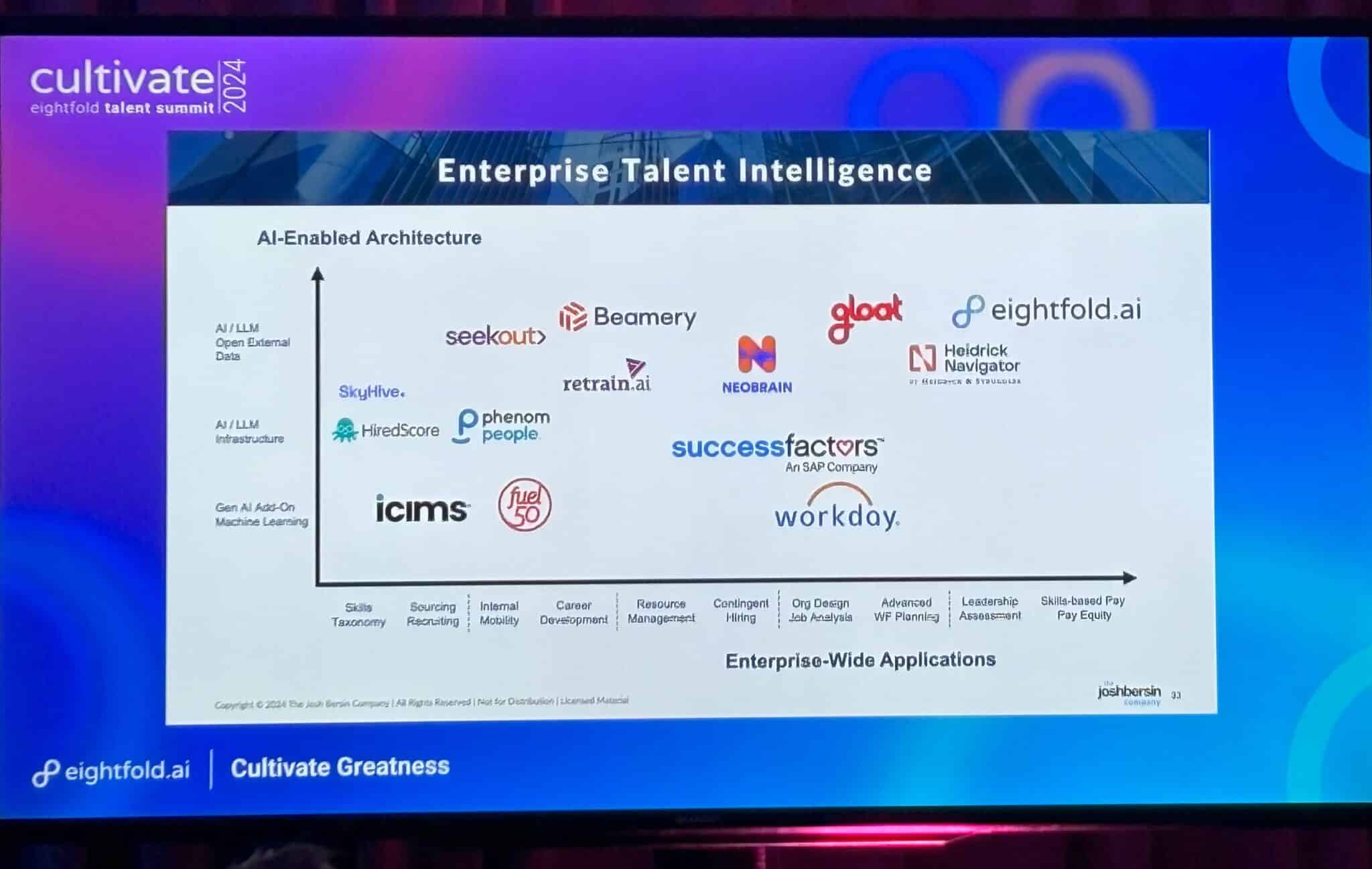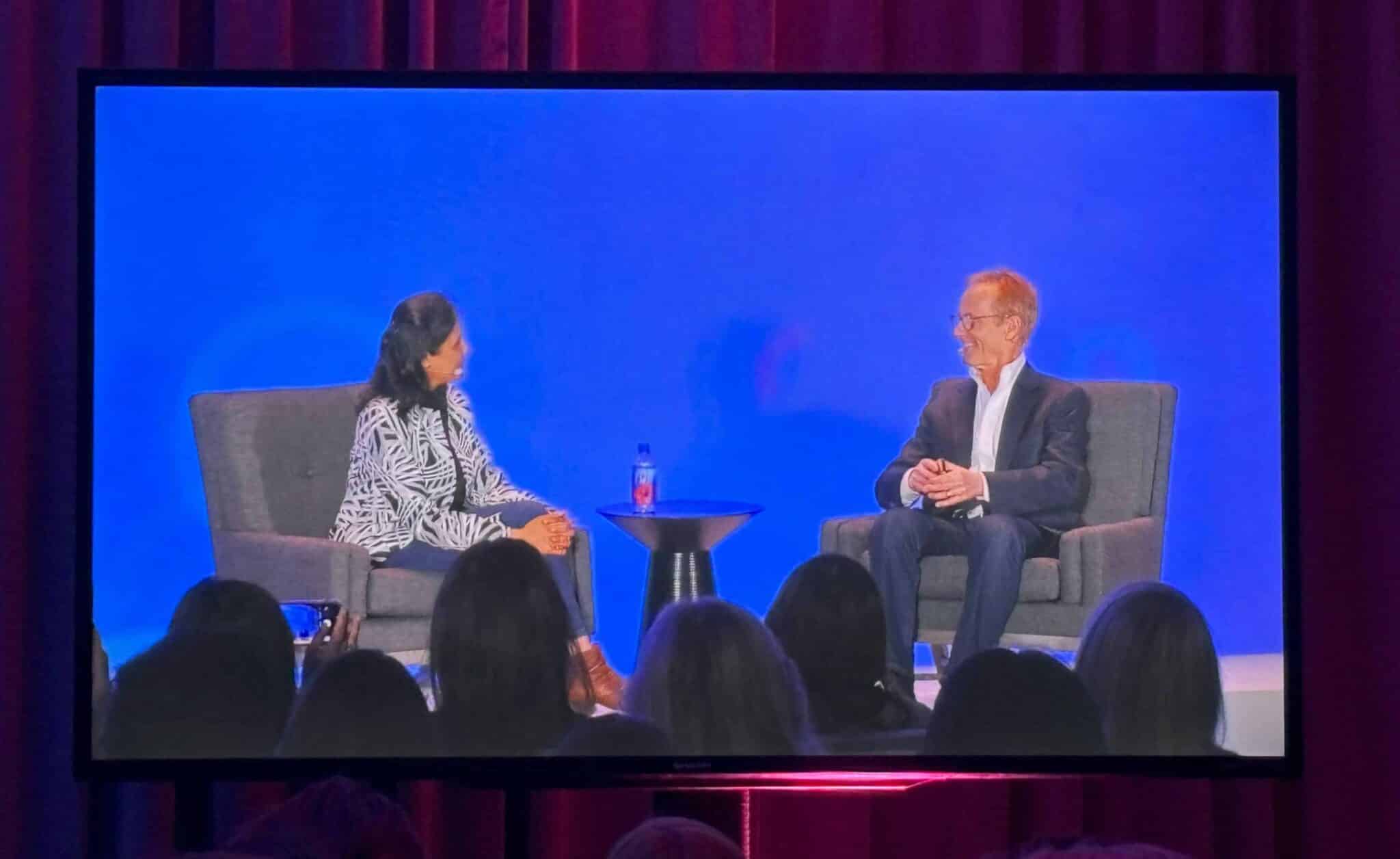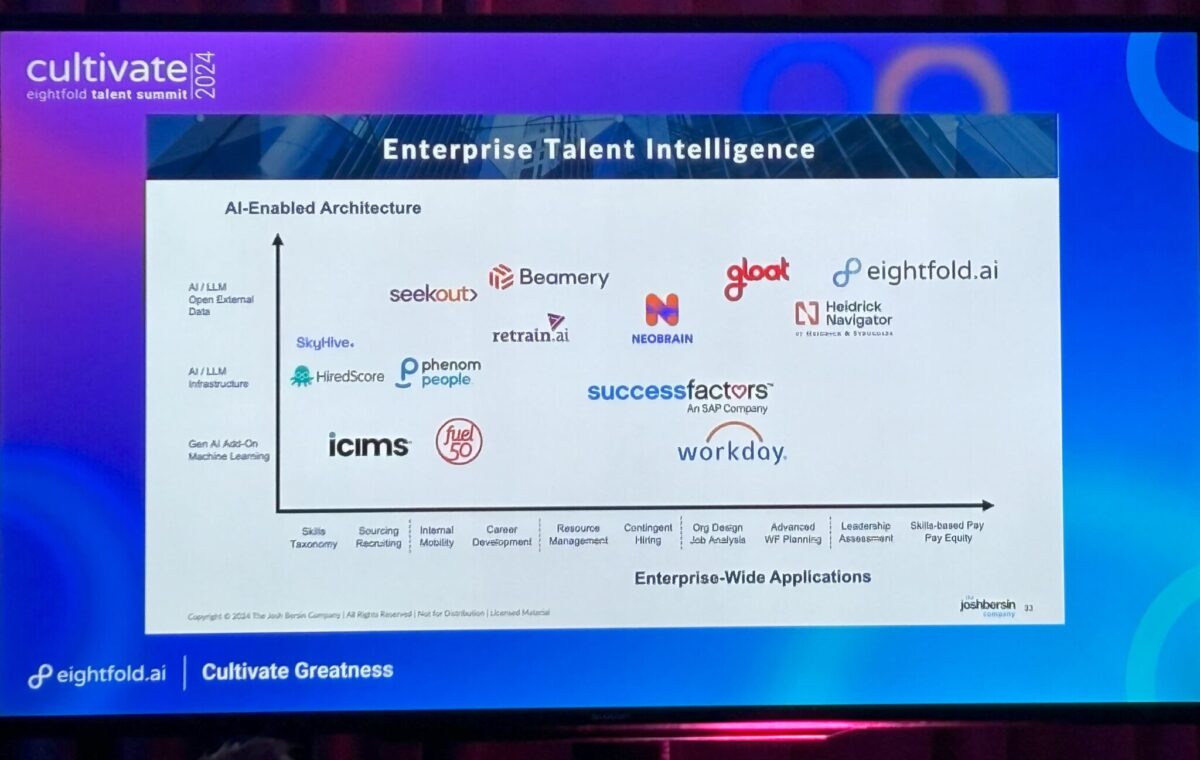The people leader at Morgan Stanley says his firm’s time to hire is down 40%. The CHRO at Moderna says her organization has found employees who are a cultural fit—at a company that has added more than 500 people this year. These HR leaders believe talent intelligence technology has enabled their orgs to make data-driven decisions that support their talent strategy.
Talent intelligence platforms are gaining traction as organizations seek to leverage AI and data analytics for effective talent management. By analyzing internal and external data sources, these solutions provide insights for hiring, workforce planning, skills gap analysis, internal mobility and talent retention. With a shrinking labor pool in almost every developing economy, according to industry analyst Josh Bersin, companies depend on every single employee, making these HR practice areas more important than ever.
Key findings on talent intelligence adoption
According to Aptitude Research Partners, companies investing in talent intelligence see double or triple improvements in employee and candidate experience, quality of hire and time-to-fill rates. At HR Tech 2023 in Las Vegas, Xabier Ormazabal from Eightfold and Madeline Laurano from Aptitude Research Partners shared these insights from Aptitude’s research:
- 72% of companies surveyed planned to increase investment in talent intelligence in 2023.
- 95% of companies said skills are more important than job titles for promotions.
- However, only 28% of companies understand what talent intelligence is.
- Just 27% of companies can identify providers in the space.

Influences on talent intelligence in 2024
HRE attended Eightfold’s Cultivate Talent Summit 2024, held in California in May, where speakers from the private and public sectors shared perspectives on talent intelligence and its influence on HR practices. Alongside the event, Eightfold announced the release of Eightfold Talent Tracking, its AI-native talent acquisition product. Based on the session topics and guest speaking points at Eightfold Cultivate, here are four emerging highlights of talent intelligence in 2024:
A need to focus on the problem
Michael Bush, CEO of Great Place to Work®, said, “Today, the best talent wins.” However, as companies strive to match talent to jobs in a changing world, many organizations become less accurate in predicting the skills required to meet their needs. Bush said that to rise to the occasion, business leaders must be “relentless” about solving problems while also being “soft” with people.
Bersin also reminded the audience to “focus on the problem, not the solution.” Prerna Ajmera, general manager of HR digital strategy and innovation at Microsoft, on stage with Bersin, said that her department’s problem was figuring out how to best “take care of” and nurture Microsoft employees, a workforce comprising 600,000 project teams. She said there is no single system that handles those hundreds of thousands of projects, so finding interfaces that connect the skills data hidden in each system was a challenge.
Ajmera said the solution is new proprietary tools that allow “co-pilots to talk to co-pilots.” Each co-pilot, being tied to particular project frameworks, knows particular things about employee skills. Connecting them results in a simplified employee experience based on more complex constructs on the back end.
Simplicity is the catalyst for adoption
Ashutosh Garg, CEO and co-founder of Eightfold AI, told a keynote audience that bringing AI-enabled simplicity to the talent process will be the “moon-landing” moment of our time. He described HR leaders as “drowning in a sea of systems and platforms” during their workday, and simplicity will be the lifeboat. Garg said AI can integrate systems so that when the user makes a request, artificial intelligence can mine all possible data sources to provide an answer. Most HR departments use dozens of platforms, making task switching a frustration. “Even if one system is lagging, it puts us back to square one,” said Garg.
Luis Niño, digital manager of technology ventures and innovation at Chevron, made an interesting point in his session, “Build, buy, borrow: How to unlock skills to build the talent-centered org of the future.” Niño said that to get adequate adoption for skills technology, AI will have to be a companion for people, not a companion for the application. In other words, the most effective tools won’t be an AI add-on to complicate the value proposition of tech, but they’ll be truly meaningful to the people using them to get their jobs done.

Using AI? Civil rights laws still apply
Mandell Crawley, CHRO at Morgan Stanley, spoke virtually with Chano Fernandez, co-CEO at Eightfold. He said the era of responsible AI is still in the early stages, especially when the organization “zooms out” to the countless talent-related use cases that can manifest. “There’s plenty to do,” said Crawley. His firm has established a gen AI council that cuts across departments—including human resources—and this group meets weekly to evaluate risk mitigation.
United States Equal Employment Opportunity Commissioner Keith Sonderling participated in a regulatory panel on AI and the law. He reminded the audience that artificial intelligence will need to produce results that comply with long-standing civil rights laws of the United States. “Rights and obligations should be laid out clearly,” said the commissioner. When using AI for talent-related employment activity, employers need to set the tone for employees and candidates so they understand the infrastructure around responsible behaviors relating to artificial intelligence use. Sonderling said that people should comprehend the ramifications of violating a law and be aware of the remedy they can seek if their rights are violated.
A strong data layer is a must
Chevron’s Niño reminded the audience that talent intelligence is about “decoupling” job titles from the people who fill them to consider the person, not the HR job requisition process. “You don’t do jobs with jobs—you do jobs with people,” he said. “We know the demand for jobs is real, but how do we understand the supply of skills?” This requires reliable data that informs the organization of the talents present in its current and potential workforce.
Niño said the “devil is in the details” in a skills-based talent economy. Platforms must consider skills clustering and use contextualization. He presented an example to explain this process easily: The term java has different meanings if the company is filling roles for developers versus baristas. Paired with robust and accurate data, an AI-first talent intelligence system can estimate the workforce’s potential, even if employees haven’t declared certain skills. Prediction proficiency can fill the gaps by asking, “How close are they to the skills cluster?” said Niño, allowing HR leaders to see clear connections between people and the potential roles they can fill.
A final reminder came from Bersin. He said that backed by the right momentum, the industry is primed to witness talent acquisition become a key “growth center” for intelligent companies. But this will require expertise. “Tools aren’t any good if people can’t use them.” He told the audience that HR would consistently need to refine the talent intelligence process so that it works for candidates, employees and recruiters.
The post 4 trends shaping talent intelligence in 2024 appeared first on HR Executive.
